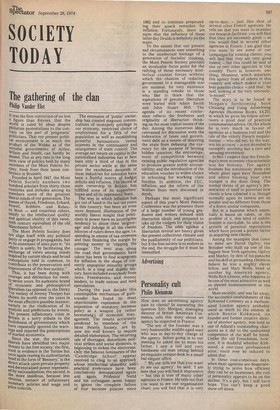The gathering of the clan
Philip Vander Elst
It was the firm conviction of no less a figure than Keynes, that the World is ruled by ideas despite Philistine protestations to the contrary on the part of 'pragmatic' Politicians. That our present political environment is as much the product of the Webbs as of the socialist governments of Attlee, Wilson and Heath, can hardly be denied. This at any rate is the long term view of politics held by many members of the Mont Pelerin Society, fresh from their latest conference in Brussels.
Founded in April 1947, the Mont Pelerin Society numbers two hundred scholars from thirty-three countries and includes among its Members some of the greatest liberal minds of our generation. The names of Hayek, Friedman, Erhard, Powell, Robbins, and Rebecca West — and countless others, tetify to the intellectual quality and spiritual vitality of this twentieth century equivalent of the old Manchester School.
The Mont Pelerin Society does not align itself with any political Party or engage in propaganda, but as its statement of aims puts it: "its Object is solely, by facilitating the exchange of views among minds inspired by certain ideals and broad conceptions held in common, to contribute to the preservation and improvement of the free society."
That, it has been doing with ' courage and distinction for twentY-seven years. Its authentic brand of economic and philosophical liberalism (as opposed to the Dinky Toy variety of Jeremy Thorpe) has shown its worth over the years in the most effective possible manner: namely in the vindication of its analysis and predictions by events. The present inflationary crisis in Britain is a sorry tribute to the foolishness of governments which have repeatedly ignored the warnings and rejected the prescriptions Of market economics.
Since the war, the economic liberals have identified two major threats to the free society: the first, Most in evidence in the 'forties but once again rearing its authoritarian head in the form of 'Bennery,' is the direct attack upon private property and decentralised power represented by nationalisation; the second, is the more insidious, because less obvious, menace of. inflationary Monetary policies and wage and 'Price controls. The extension of 'public' ownership has created stagnant concentrations of monopoly privilege in our economy, restricted choice of employment for a fifth of our population as well as establishing powerful bureaucratic vested interests in the continuance and enlargement of state control. The average net return on capital in the nationalised industries has at best been only a third of that in the private sector while at the same time the exorbitant demands of these industries for subsidies have been a fruitful source of budget deficits and inflation. The'record of state ownership in Britain has fulfilled none of its supporters' hopes and all its opponents' fears. The way in which inflation has got out of hand in the last ten years in this country, has been an even more dramatic illustration of the worldly liberal insight that politicians in power have an incorrigible tendency to abuse their 'seignorage' and indulge in all the classic felonies of rulers down the ages, i.e. spending in excess of tax revenues and then financing the margin by printing money or 'clipping the coinage,' The next step along the road that governments have taken has been to find scapegoats for inflation in the shape of currently unpopular minority groups which, in a long and shabby history, have included everybody from Jews, Freemasons, and money lenders, to trade unions and land speculators. During the past decade this contemptible mechanism of guilttransfer has found its most objectionable expression in the imposition of statutory incomes policy as a weapon (or rather boomerang), of economic management. The results accurately predicted by members of the Mont Pelerin Society, are by now too well known to require detailed elaboration. The recurring tale of shortages, distortions, political strikes and social divisions, is beginning to sicken the electorate. Only the fatuous luminaries of the 'Cambridge School' appear resolved to cling to an approach whose intellectual absurdity and practical irrelevance have been conclusively demonstrated again and again. Professor Neild and his colleagues seem happy to ignore the complete failure of four incomes policies since 1962 and to continue propounding their quack remedies for inflation. Fortunately, there are signs that the influence of these latter day Druids is definitely on the wane.
To the extent that our present sad circumstances owe something to the intellectual heritage of a generation of Socialist thinking, the Mont Pelerin Society provides an invaluable focus point for the rallying of those necessary intellectual counter forces without which the chances of reducing government to a manageable size are minimal. Its very existence is a standing rebuke to those who like to think that the aspirations of genuine liberalism were buried with Adam Smith and John Stuart Mill. The agenda of its recent conference reflects the freshness and originality of libertarian thinking on the most topical issues of the day. Among the numerous ideas canvassed for discussion were the indexation of taxes and government debt as a means of deterring the state from debasing the currency for the purpose of levying hidden taxation; the encouragement ofcompetition between existing public regulation agencies to promote greater public accountability; and the introduction of the education voucher to widen choice in schooling for working class families. In addition, the EEC, inflation; and the reform of the Welfare State were discussed in depth.,
Perhaps the most significant aspect of this year's Mont Pelerin Conference was the presence there of a large number of young graduates and writers imbued with libertarian ideals and prepared to take up the cudgels for their vision of freedom. The odds against a libertarian revival are heavy given the present collectivist climate and the pusillanimity of our politicians, but if the free society is to endure in the end, the struggle for it must be intensified.


































 Previous page
Previous page